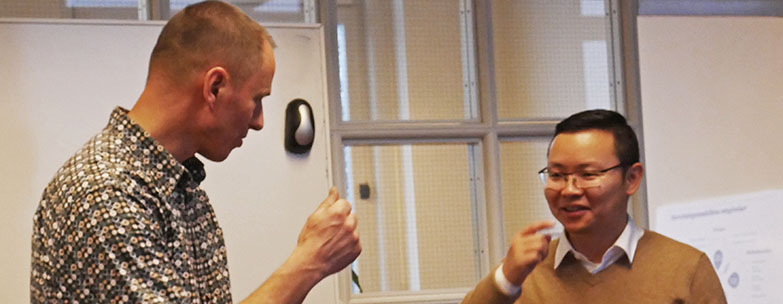Passionate pitching taught to rookie start-ups
When a founder of a start-up company stands in front of her first investor, she had better be able to explain herself. As a service to inexperienced entrepreneurs, the student-start-up community SCIENCE Innovation Hub and Biopeople launched a series of pitching workshops in November. Copenhagen Science City visited one of them.By Jes Andersen.
The art of pitching to persuade
SCIENCE Innovation Hub is a University of Copenhagen initiative. It is home to some 40 start-ups with at least one of the University’s students on each team and is located on the top floor of a marble clad sixties building, which it shares with the Department of Computer Science. On this bleak Tuesday morning, five untried entrepreneurs showed up to learn the fine art of pitching.
Misleadingly simple
In the world of entrepreneurs, a pitch is a brief presentation that answers three fundamental questions.
- Why does the company exist
- What is the solution the company is bringing to market
- Who is building the new company.
These questions may look simple. It turns out to be much harder to provide them with simple answers.
Actor guiding hard-science experts
Pitching is more art than science and the art is closer to theatre than to literature. The hub had hired Arne Stentoft, a trained actor and coach, to guide the entrepreneurs. His main message is that you must radiate passion if you want someone to help you build a company. Science-based founders will usually prefer talking about their technical solution, so they need the help.
Wide variety of start-up ideas
Five very diverse entrepreneurs joined this particular workshop. One dreams of introducing flu diagnostics and four food and beverage entrepreneurs want to respectively fight food waste, to produce more sustainably, to produce functional foods and to introduce winemaking to a region with no tradition for wineries.
The why, the what and the really who
Mr Stentoft invited the founders to isolate the why, the what and the who and examine these in turn. In order to pitch a persuasive “Why”, the founders need to verbalize why their work is important, to whom it is important and why the founder is the correct person to tackle this problem. This is usually where the founders passion emerges. Many founders have deeply personal reasons for wanting to start a particular business. If that reason shines through, it will make the entire pitch shine.
Understanding what the company hopes to sell
To answer the “What”, the founder needs to develop a non-technical description of the idea, solution or product. This should illustrate what problem it solves, and what is unique about the solution.
Because nobody else could do it so well
Finally, the “Who” should explain who needs the idea and how their lives will improve once your company is successful. This section should also present the team behind the company and include details about the skills of each team-member.
A crucial tool for every stage of the start-up journey
An effective pitch should help others appreciate the purpose of your company, understand how they can co-operate to help you become a success and judge whether they can relate to those already on-board. A great pitch can help founders find co-founders, staff, customers, collaborators and, eventually, investors.
Free feedback
Workshop participants have all been invited to practice their pitch at the event “Angels and Authorities- Pitching for your first funding”. At this event, an angel investor and an investment manager from Innovation Fund Denmark will give feedback to founders. Anyone is welcome to witness the pitches and hear the feedback to them. The event is free of charge, but you must sign up here.




